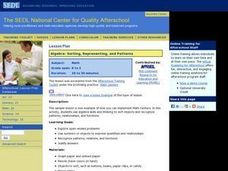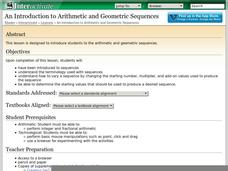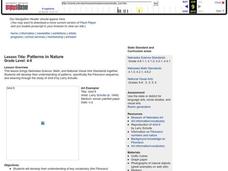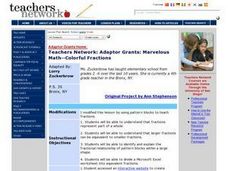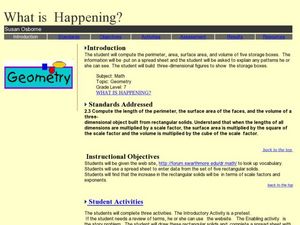Curated OER
Riding on a Pendulum
A comprehensive resource gets fourth grade physical scientists making observations about the period of a pendulum and then applying knowledge to a playground swing. Through seven different stations, they will record observations and...
NASA
Food For Thought
Science can be quite tasty. A delectable unit from NASA shows learners why it's important to consider food, nutrition, and health in space. Four lessons explore the idea in great depth, including testing cookie recipes. Along the way,...
Curated OER
Skip Counting to Music
Your youngest mathematicians skip count by 2's, 5's, and 10's as they sing along to a Hap Palmer song that helps them remember the patterns. Students practice in whole group and then individually with the worksheet provided, using the...
Curated OER
The Fibonacci Sequence
Students investigate a numerical pattern and look for evidence of mathematical patterns in nature. They solve puzzles and work with a partner to predict sequential numbers in a series.
Curated OER
Functions
Fifth graders explore mathematics functions. In this functions lesson, 5th graders explore 1 and 2-step functions involving addition, subtraction, multiplication, and division. Students also practice solving problems that their...
Curated OER
Algebra: Sorting, Representing, and Patterns
Students sort objects and create patterns. In this sorting and graphing lesson plan, students work at centers to find a way to sort a group of objects, then make a graphical representation of the number of each item. Finally, students...
Curated OER
Exploring Pascal's Triangle and Other Recursive Patterns
Students explore patterns in everyday life and in the mathematic world. They create various concrete examples of patterns and verbally describe these patterns to a fellow student.
Curated OER
Math Quilts
Young scholars examine geometric shapes. In this geometric shape lesson plan, students examine how geometric shapes flip, turn, and slide to create a pattern. Young scholars analyze the role that quilts played in helping slaves escape...
Curated OER
Measuring Pattern Block Angles
Sixth graders identify various angles by using pattern blocks. For this measurement lesson, 6th graders find out how many degrees are in each of the different angles of the various pattern blocks.
Curated OER
Patterns in the Sums of Polygon Angles
Sixth graders discover the patterns of sums of polygon angles. In this math lesson plan, 6th graders study the properties of geometric shapes to solve problems as they participate in hands-on activities.
Curated OER
Best lesson in the whole world!
Students study the concept of fraction using mathematical reasoning. In this problem solving fraction lesson, students use various methods to explain their reasoning in solving fractions. Students use a number of different prompts to...
Curated OER
I Wonder How Fast Manduca Grows Compared To Me
Students study the Manduca bug and its growth data. They look for patterns and compare their own growth rate to that of the Manduca.
Curated OER
Introduction to Statistics: Mean, Median, and Mode
Students explore the concepts of mean, median, and mode. They develop an understanding and familiarity with these concepts. Students explore mean and median in an efficient way. Students explore three different measures of center.
Curated OER
How Alike Are We?
Fourth graders find the range, mode, median, and mean for each of the data sets (height and shoe size). They discuss which measure of central tendency for each data set best represents the class and why. Students graph the shoe size and...
Curated OER
Twists and Turns
Students reflect, rotate, translate, and dilate figures in the Cartesian coordinate plane using grid paper and dot paper. They use transformations (i.e., reflections, translations, rotations, and dilations) to describe geometric patterns...
Curated OER
Algebraic Relationships
Here are 17 various forms of problems that range from matching equivalent expressions to word problems. Included are problems for substutiing values into expressions and using the order of operations, simplifying algebraic expressions,...
Shodor Education Foundation
An Introduction to Arithmetic and Geometric Sequences
Help your class look for patterns as they create their own arithmetic and geometric sequences. Engage learners with an introductory discussion on sequences and use the applet to let them explore how sequences are formed. Teachers might...
EngageNY
Advanced Factoring Strategies for Quadratic Expressions (part 2)
What do you do with a difficult-to-factor quadratic expression? This lesson provides the answer. Pupils learn a grouping strategy to help factor trinomials. When guess and check seems too tedious, this method is the "works every time"...
Curated OER
Geo Jammin' By DeSign - Day 1, Lesson 2: Dancing Duo
Second graders and teachers identify geometric vocabulary word by searching a geometry website. They create a Quilt Word Wall using the geometry words.
Curated OER
Patterns in Nature
Students learn about artist Larry Schulte and view examples of his work. They create addition sentence for the first seven numbers of the fibonacci sequence and use unifix cubes to build that sentences. Students color and create three...
Curated OER
Marvelous Math -- Colorful Fractions
Students begin the lesson by discovering that a fraction is one part of a whole. In groups, they practice reducting larger fractions into small fractions and discovering they are equal. They use blocks to identify the relationship...
Curated OER
Patterns and Linear Functions
Students investigate the concept of a linear function. They use geoboards to find the interior angle sums. The sum of the angles is found to equal 180 degrees. Students also investigate quadrilaterals.
Curated OER
Immigration Lesson Plan
Students examine immigration patterns in Canada and the United States. In this immigration lesson, students compare and contrast immigration patterns and policies in the 2 countries as they conduct research using print and Internet...
Curated OER
What is Happening?
Review area, perimeter and volume using this lesson. After reviewing key vocabulary relating to these concepts and answering story problems, learners compute the perimeter, area, surface area, and volume of five storage boxes.







